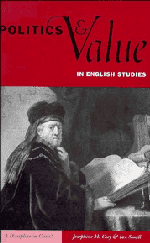4 - Value in literary history
Published online by Cambridge University Press: 27 January 2010
Summary
Literary history has two basic elements: a subject-matter, ‘literary’ works, which distinguishes it from other kinds of history; and a historiography, the theoretical principles and methodology which determine the kind and status of historical accounts of those works. Any attempt to rewrite traditional literary history involves contesting one or both of these elements. Arguments which question traditional literary history have frequently assumed that political decisions underlie the identification of works as ‘literature’. These arguments hold that as literary identity is a value-laden concept, so to designate works as literature necessarily involves endorsing certain values (which are generally defined as political), which in their turn become silently encoded in histories of those works. In this view it follows that the aims of any new or revised literary history should be to uncover both those values and the processes by which they are endorsed and perpetuated by historians; it would aim, that is, to make manifest the politics which underlie traditional literary history. In broad terms, this procedure has been the route of most Marxist and feminist rewritings of traditional literary history.
Another and quite different critique of the subject-matter of traditional literary history is that implicit in theories such as structuralism and deconstruction. Once again, the value-laden nature of literary identity is implicated in these critiques, but in a way which is quite distinct from Marxist and feminist rewritings of literary history.
- Type
- Chapter
- Information
- Politics and Value in English StudiesA Discipline in Crisis?, pp. 99 - 134Publisher: Cambridge University PressPrint publication year: 1993



